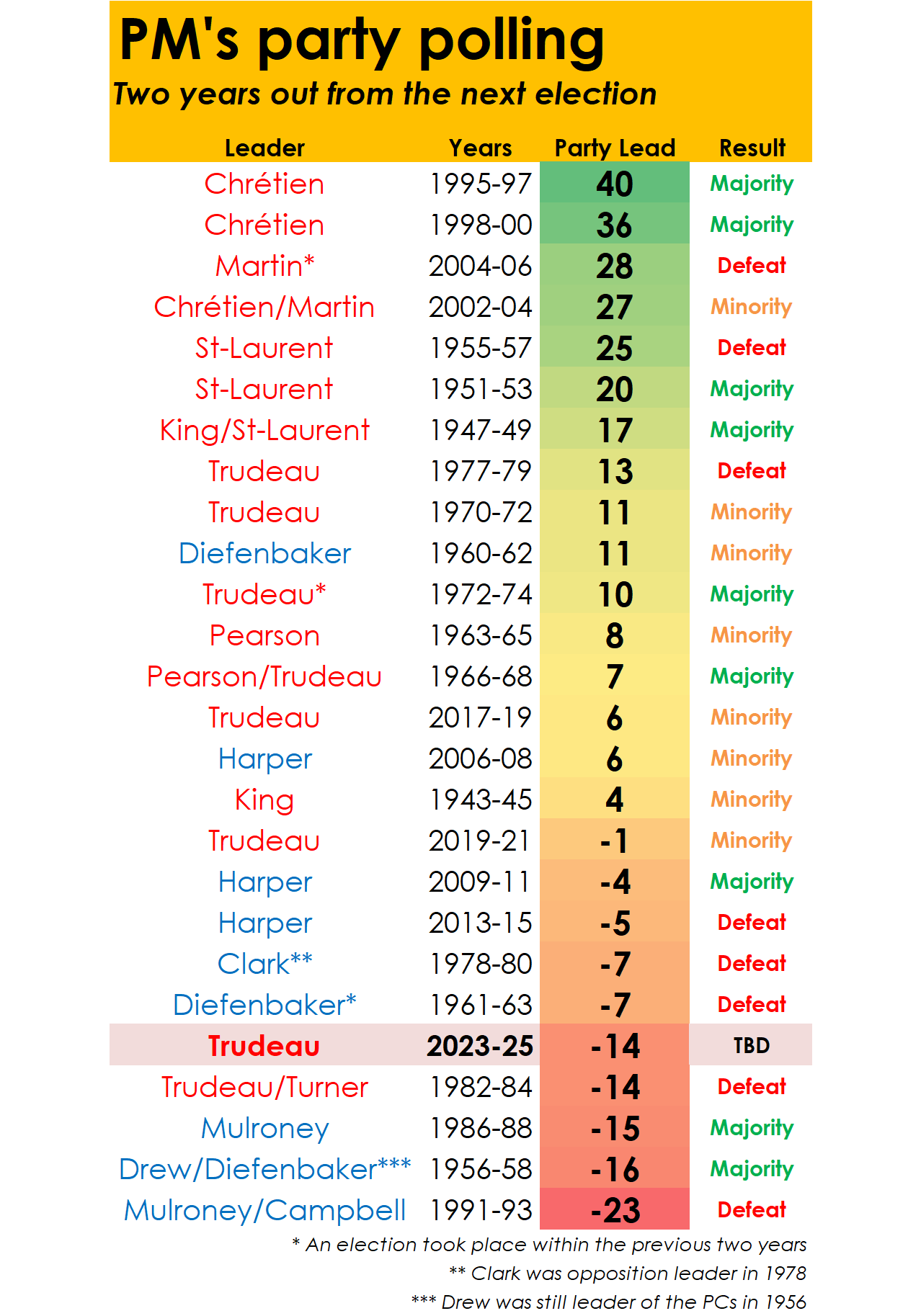Weekly Writ for Nov. 8: Two years out, Trudeau is in a deep polling hole
Few prime ministers have dug themselves out this far out from an election; plus, an Ontario byelection and new polling numbers.
Welcome to the Weekly Writ, a round-up of the latest federal and provincial polls, election news and political history that lands in your inbox every Wednesday morning.
There’s been lots of talk lately that Justin Trudeau’s time might be up and how past prime ministers in the same position as him have been cooked, whether they recognized it or not.
Things have certainly shifted over the last few months. Had you asked me in the spring for odds on Trudeau running again in 2025, I would have set it at 95%. Now, I’m not even sure if I can put it as high as 50%.
When things are snowballing, every decision can make matters worse. The prime minister’s announcement that home heating oil would be exempted from the carbon tax — a move that primarily benefits Atlantic Canadians — is just the latest misstep. Polls put the Liberals some 14 points behind the Conservatives, though that trend had already set in before this decision was made.
That’s a big hole to dig out of.
And, historically speaking, few past prime ministers in this deep have managed to do it.
The chart below shows how each past prime minister’s party was polling about two years out from the next election, ranked from the biggest lead (the Liberals’ 40-point lead over the divided opposition in 1995) to the largest deficit (the PC’s 23-point disadvantage in 1991). While there have been a few defeats at the top and a few comebacks at the bottom of this list, for the most part it is better to be ahead than behind even two years out from the next date with voters.
Since polling began in the 1940s, in only three other cases has the prime minister’s party trailed in the polls by larger margins than Justin Trudeau’s Liberals do today.
Two of those cases ended well. Brian Mulroney turned a few disastrous first years in office into a majority re-election, thanks to making the 1988 election one about free trade with the United States rather than the PCs’ mixed record. The other case has a real asterisk on it. The PCs were trailing the Liberals by 16 points in 1956, but those were the last months of George Drew’s leadership on the opposition benches. John Diefenbaker became leader later that year and pulled off his upset surprise victory in 1957, turning that into a landslide majority in 1958.
So, that hardly counts as a potential model for Trudeau to follow.
The other case went spectacularly badly. The PCs were behind the Liberals by 23 points in the fall of 1991. A change of leadership and two years later and — ta-da! — the PCs won two seats.
Trudeau’s current standing is flanked by other similarly bad examples. The good ship Diefenbaker was already leaking in 1961 before it took on even more water in 1962 and finally sank in 1963. Stephen Harper’s Conservatives were down by five points in 2013 and approaching eight years in office. They were defeated (by Justin Trudeau, as it happened) in 2015.
And then there is the example of 1982. In the fall of that year, Pierre Trudeau’s Liberals were down by 14 points, matching Justin Trudeau’s current predicament. Pierre Trudeau hung on until 1984 before finally handing over the reins to John Turner, who was only a few months into the job before he was bulldozed by Mulroney’s landslide in 1984.
That’s not a particularly inspiring example for modern Liberals.
Now, to what is in this week’s instalment of the Weekly Writ:
News of a provincial by-election in Ontario, fundraising figures in British Columbia and a leadership review in Newfoundland and Labrador.
Polls on what the Liberals need to do (or have happen) in order to turn things around, plus new numbers out of Quebec. We also see what British Columbians think of their federal cabinet ministers and what Canadians think of the Israel-Palestine issue.
A reduced majority for the Conservatives (and the CAQ) if the election were held today.
Byelection showdown in Kitchener Centre in this week’s riding profile.
Lester Pearson tries for a majority in the #EveryElectionProject.
A milestone for Mike Schreiner, the dean of party leaders.
IN THE NEWS
Kitchener Centre byelection date set
Doug Ford could have waited a little longer, but why not cause some problems for the opposition New Democrats instead when it could hurt the most?



